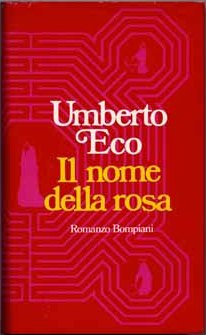The Name of the Rose

First edition cover (Italian)
|
|
| Author | Umberto Eco |
|---|---|
| Original title | Il nome della rosa |
| Translator | William Weaver |
| Country | Italy |
| Language | Italian |
| Genre | Historical novel, mystery |
| Publisher |
Bompiani (Italy) Harcourt (US) |
|
Publication date
|
1980 |
|
Published in English
|
1983 |
| Media type | Print (Paperback) |
| Pages | 512 pp |
| ISBN | |
| OCLC | 8954772 |
| 853/.914 19 | |
| LC Class | PQ4865.C6 N613 1983 |
The Name of the Rose (Italian: Il nome della rosa [il ˈnoːme della ˈrɔːza]) is the 1980 debut novel by Italian author Umberto Eco. It is a historical murder mystery set in an Italian monastery, in the year 1327, an intellectual mystery combining semiotics in fiction, biblical analysis, medieval studies and literary theory. It was translated into English by William Weaver in 1983.
Franciscan friar William of Baskerville and Adso of Melk, a Benedictine novice travelling under his protection, arrive at a Benedictine monastery in Northern Italy to attend a theological disputation. Upon their coming, the monastery is disturbed by a suicide. As the story unfolds, several other monks die under mysterious circumstances. William is tasked by the monastery's abbot to investigate the deaths, and fresh clues with each murder victim lead William to dead ends and new clues. The protagonists explore a labyrinthine medieval library, discuss the subversive power of laughter, and come face to face with the Inquisition, a reaction to the Waldensians, a heresy which started in the 12th century and claimed to advocate an adherence to the Gospel as taught by Jesus and his disciples. William's innate curiosity and highly developed powers of logic and deduction provide the keys to unraveling the abbey's mysteries.
Eco, being a semiotician, is hailed by semiotics students who like to use his novel to explain their discipline. The techniques of metanarrative, partial fictionalization, and linguistic ambiguity are all apparent. The solution to the central murder mystery hinges on the contents of Aristotle's book on Comedy, which has been lost. In spite of this, Eco speculates on the content and has the characters react to it. Though the motif of this lost and possibly suppressed book which might have aestheticized the farcical, the unheroic and the skeptical, Eco also makes an ironically slanted plea for tolerance and against dogmatic or self-sufficient metaphysical truths – an angle which reaches the surface in the final chapters.
...
Wikipedia
